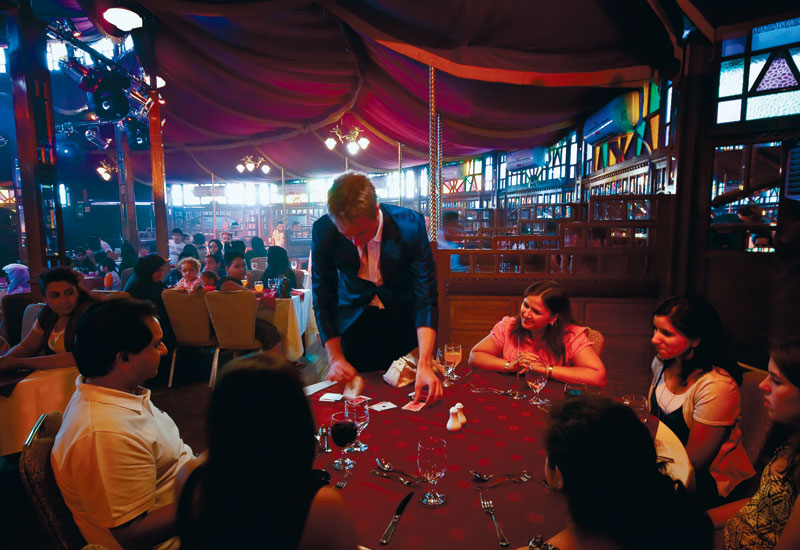According to Bergerault, the region is ripe for such adventurous F&B concepts.
“People here may be spoilt for choice, but they are very inclined to experience new things and have therefore responded well to L’atelier des Chefs,” he said.
At Coral Deira — Dubai, guests can enjoy their meal with a dash of culture and learning at Rasoi: a Mughlai restaurant that is also a museum.
“Our mini-museum offers a glimpse of the glorious Mughlai era, as well as serving authentic Mughlai cuisine,” said the property’s F&B manager Manjunath Rajan.
“The beautiful eatery is divided into 11 alcoves and each tells its own story from the Mughal period.”
The multi-experience dining arena has numerous benefits for the operator or caterer, as Dish’s Dyer pointed out.
“A show such as House of Illusions has one major bonus for a company such as ours — regular business,” he pointed out.
“We usually do one-off events, such as gala dinners or cocktail parties. It would have been a very quiet few months for us over the summer months; so this project was a great opportunity,” he noted.
L’atelier des Chefs’ Bergerault added that the secret to making a success of a value-added F&B concept was to judge the market correctly.
“Business benefits come with offering the right audience the right ingredient at the right time,” he said.
Of course, it’s not all plain sailing when you’re mixing food and entertainment; according to Mindset’s Maskati, operators “will always face challenges when they do these sorts of events”.
Dish’s Dyer added that the House of Illusion catering was “unbelievably different” to anything the firm has done before — and consequently required a great deal of training and dedication.

| Advertisement |
“It was two shows a night for ten weeks, so we did about 84 shows in total, serving around 300 per night. We were also managing the reservation and box-office system. So it was a big job,” he said.
“But all the prep was done off-site in an air-conditioned catering tent, so I’d say the biggest challenge was the logistics of getting the mise en place done in our kitchen, transferring it to the site, heating it up, keeping it warm, plating up on time and getting it all served fast.”
Coral’s Rajan also noted that it was “an enormous challenge to create something unique” that was still workable.
“Daily upkeep and maintenance of a restaurant like ours is not easy,” he said. “We have to work really hard to keep it in good shape.
“In addition, the staff have to be well-trained and able to explain the concept of the place to diners who wish to know more.”
It sounds like a lot of work: can this ‘multi-experience dining’ trend take off in the Middle East, or is it simply a temporary value-add measure that will fade away once the economy perks up?
According to Mindset’s Maskati, it’s “a natural thing for consumers to look for more value” in their choices.
Coral’s Rajan added: “People today do not go out as frequently as they used too. Subsequently, they want to go somewhere they can enjoy and discover something more than just a meal — particularly during the downturn.”
L’atelier des Chefs’ Bergerault said it was up to the operators themselves to ensure their innovative added-value ideas stood the test of time.
“The key to success nowadays is consistency; although people love to try new things, what they really want is something of unwavering quality,” he asserted.
It seems that as long as operators are realistic about the viability of combining entertainment and F&B concepts, this is a trend the region will see more of.









 Search our database of more than 2,700 industry companies
Search our database of more than 2,700 industry companies









